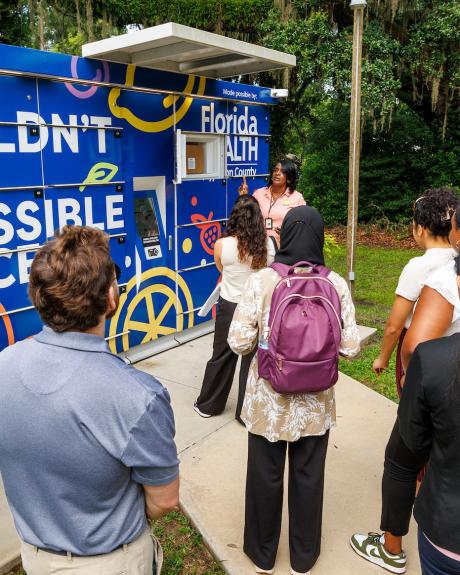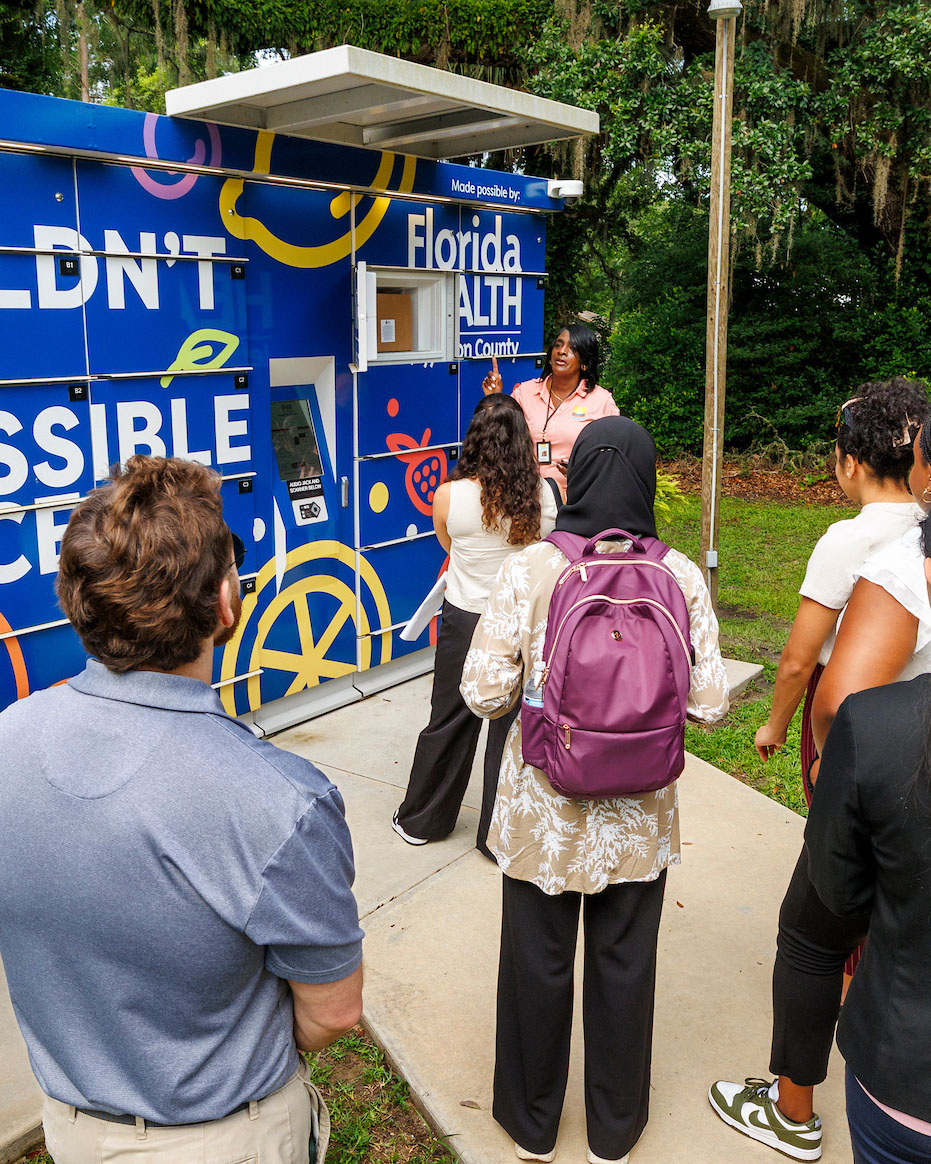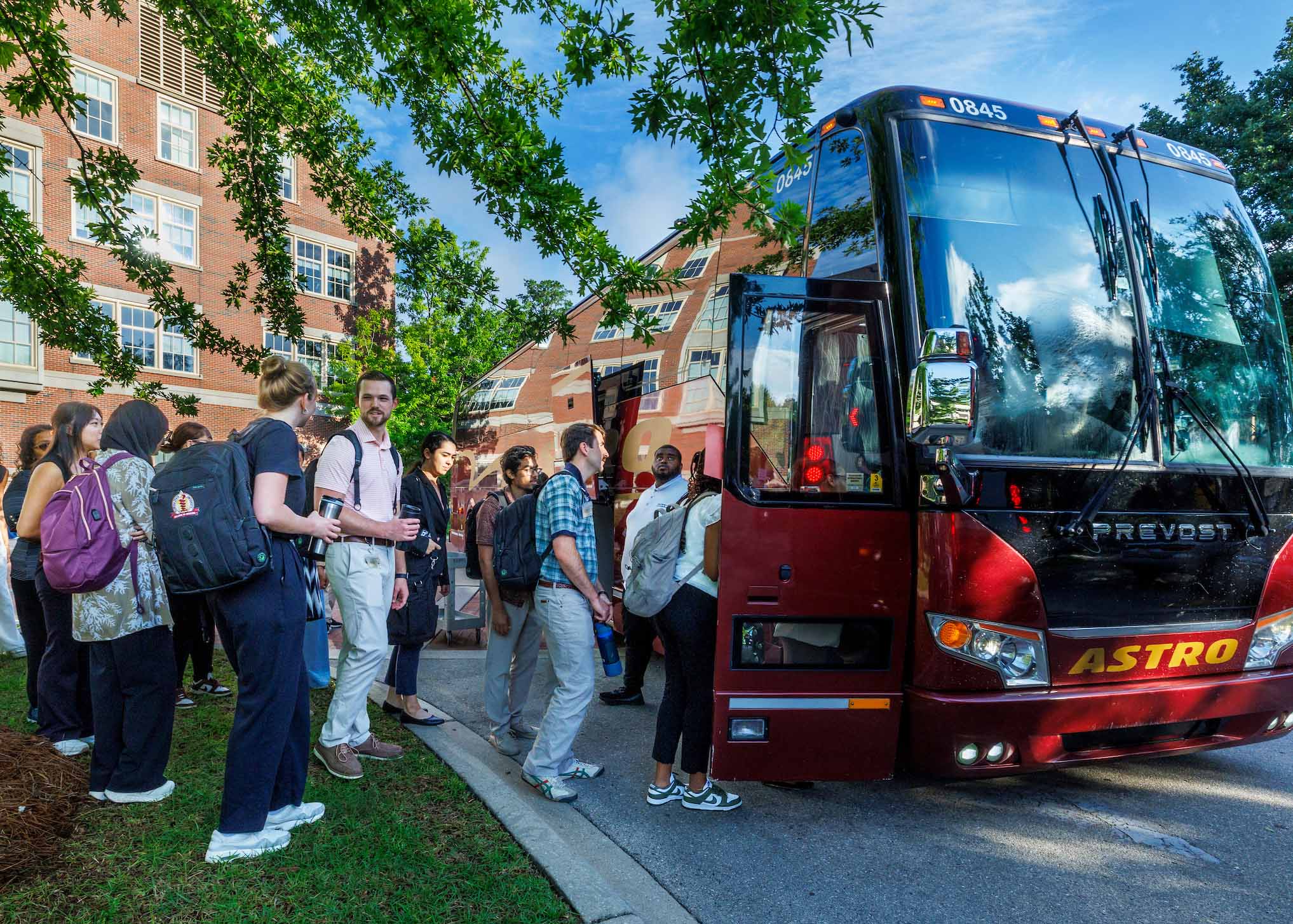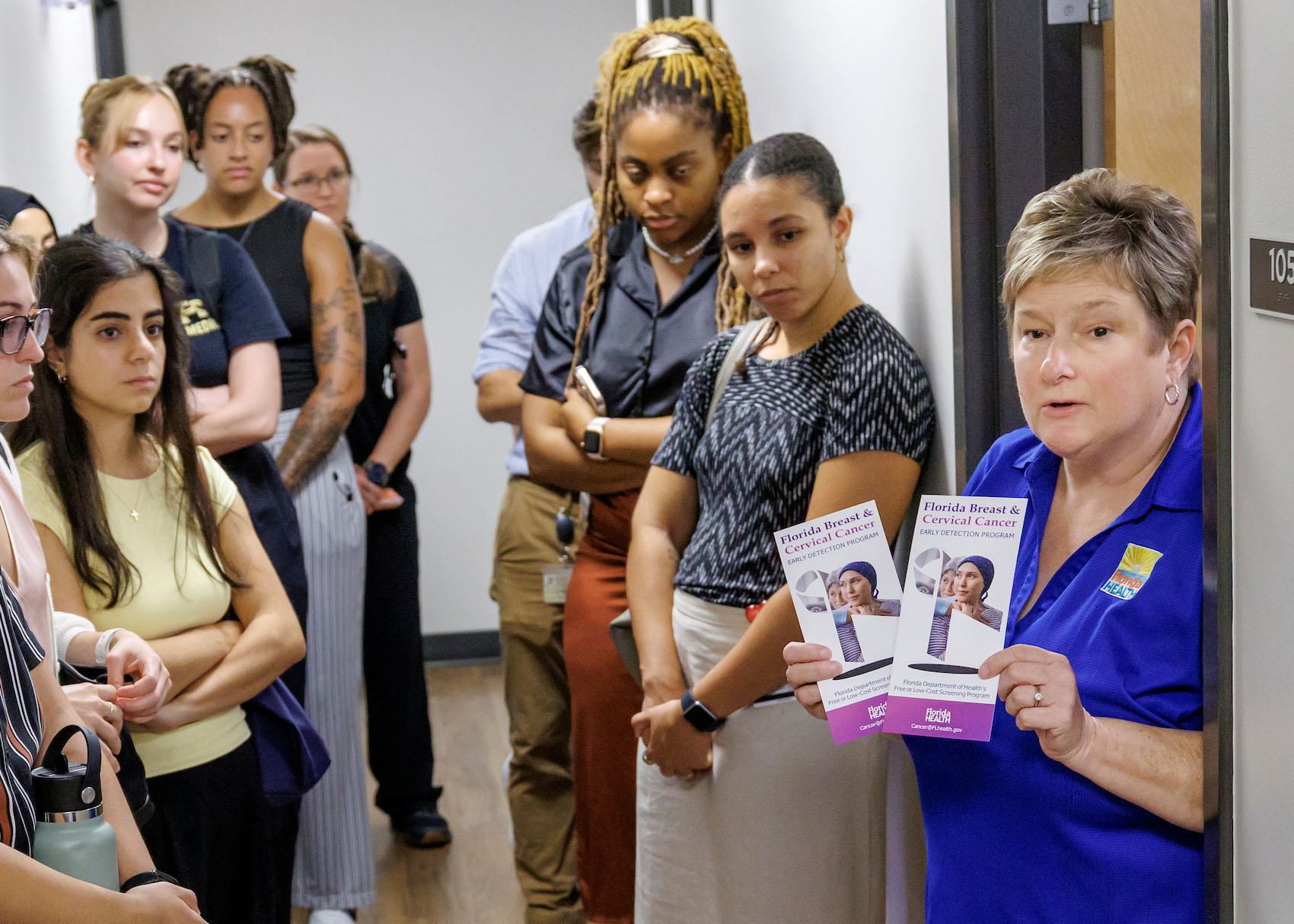Rural Learning Experience trip opens eyes to challenges and opportunities


Piling into four charter buses staged in the FSU College of Medicine parking lot, 192 first-year students from across the M.D., PA and Bridge to Clinical Medicine programs embarked on the day-long July 1 Rural Learning Experience.
Back for a second consecutive year, following a four-year, COVID-imposed hiatus, the RuLE Trip is designed to expose the newest students to rural communities in the surrounding counties and the health care challenges they face.
The inaugural trip, originally called the Rural Educational Orientation Program, took place in 2010. It was renamed in 2014 when it was incorporated into the first-year medical school curriculum. The Florida Blue Foundation continues to provide funding support.
“The trip's value has only grown in recent years,” said Kerwyn Flowers, D.O., the college’s director of Rural Medical Education who is now dean of the Tallahassee Regional Campus. “With the addition of a mini-community health assessment component, students now have the opportunity not only to observe but also to engage meaningfully with the unique challenges and assets of rural communities.”
The 2025 version carried groups to four destinations: Monticello (Jefferson County), Quincy (Gadsden County), Marianna (Jackson County) and a combination of Bristol and Blountstown (Liberty and Calhoun counties).
“Given the national and statewide trends – such as the declining number of students pursuing family medicine and the persistent shortage of rural health providers – this trip takes on even greater significance,” Flowers said. “It serves as a rare and powerful tool for early exposure, which is known to influence specialty choice and practice location.”
Those points were driven home on the first stop of the Monticello leg at the Jefferson County Health Department. The students are split into three groups as they toured the sprawling, single-story building with white siding along U.S. 90 on the west side of town. The county of 13,000 residents has just one full-time family medicine physician – and no specialists – which requires the Florida Department of Health facility to offer a wide range of services.
Those include prenatal care, family planning and immunizations, twellness programs, infectious disease services, emergency preparedness and response resources and public health.
A food bank stands just outside the building, ready to assist those who otherwise may not have, or be able to afford, nourishment for their families.
Students encounter similar experiences on each of the other legs. In addition, they have the opportunity to get a feel for what living in a small town is like, whether it’s visiting popular sites, strolling through the quaint downtown areas, or engaging in panel discussions with providers and residents.
With two traffic lights, Monticello has one more than first-year medical student Judd Smith’s Panhandle hometown of Jay, located north of Pensacola and virtually bordering the Alabama state line.

“It’s been incredibly important just to be exposed to just how differently everything is here,” Smith said. “A lot of my classmates are from larger cities across the state … so, for them to be able to have this experience, to be able to just see how different things operate, to be able to be in a town with only one provider, no specialist even around, I think it's really important.”
Smith has a different perspective than most of his classmates. His father and grandfather represent two generations of primary care physicians in Jay. He plans to extend that lineage to a third generation, returning to serve the Jay community following residency.
“The relationships with the patients are just so incredibly important,” he said. “I've been able to have a lot of experiences within the clinic and in the hospital, see the way that they interact with their patients. It's incredibly personal, and I really like that a lot. It goes beyond just the medicine itself. It’s a strong personal connection.
“Knowing the patient, the patient's parents, the patient's children – I really like that aspect of it.”
Walking around downtown Monticello provided the students opportunities to visit the historic theater, grab a latte in the local coffee shop and check out stores. Those encounters left impressions as well.
“Going into the health department was cool to see the kind of resources that they have available,” said PA student Kathryn Zelsman, who made a coffee shop stop before wandering across the street and into a business. “There is a thrift store that's operated by volunteers, and those proceeds go back to an animal shelter. That just speaks a lot to their character as a town.
“And every interaction that you have is really friendly and personable. I don't think you get that in larger cities. Like, every time a door is open for you, it's a small-town feel. It makes a lot of us students more interested in serving communities like that because you know you're needed, and the people are so grateful for it.”
The students weren’t the only first-time participants in RuLE.
Ransome Eke, M.D., Ph.D, MBA , an associate professor in the Department of Family Medicine and Rural Health, joined the faculty in November 2024 from the Mercer University School of Medicine in Macon, Georgia. There, he was an associate professor of Community Medicine and principal investigator for the CDC-funded Health Equity Navigators program, a project dedicated to reducing health disparities in Georgia's rural and underserved communities.
This, however, was a unique experience for the Nigerian-born and trained Eke, who had a fellowship in Greenville, South Carolina, and received advanced degrees from Tulane University School of Public Health and Tropical Medicine in New Orleans, Louisiana and the University of Memphis School of Public Health in Tennessee.
“We don't take [students] on orientation the way we saw it here, which was very impressive,” Eke said. “We sent them to their preceptors … but we don't go with them as a group to learn about the place, the locality, the facilities – all the opportunities right there. I was really blown away by this.”
While the needs are apparent in these rural communities, challenges exist, both in terms of funding resources and the complexity that comes with being the 24-7 family doctor.
During the health department visit, Zelsman asked one of the providers what kind of value would a PA bring to the community.
“She said, honestly, we would have to do more lobbying to get them to have positions available just because they don't have the resources and the funding to employ more people,” Zelsman said. “That tells you a lot right there.”
Limited resources, financial and otherwise, are an obstacle all rural areas face. Then there’s the matter of responsibility that comes with those positions.
“For me, working in rural population has been very rewarding,” Eke said. “I tell my students that if you work in rural areas, you're a doctor everywhere – on the streets, in the grocery shop, in church. People want to talk to you. So that familiarity, that bonding, you know, is something that can be very rewarding.”
For some, it can also be very demanding when it comes to work-life balance.
“Giving students that experience to know what it is like working with a rural population – the kind of personality, the kind of aura and all that - I think it's worthwhile,” Eke added.
Jefferson County Chamber of Commerce President Amy McDonald recognizes those challenges.
“It takes a lot to entice a health care provider to move here,” she said. “They have to have a heart to serve.”
McDonald also acknowledges that it requires someone who is comfortable with a slower pace of life, which suited the family doctor who “delivered the last generation from a small-town storefront office” in downtown Monticello.
Then there’s the matter of the required time it takes to build trust within a community that is often reluctant to give it freely, a point that was driven home by a mother who addressed the students during a panel discussion held late in the day at Florida Georgia Citrus on the outskirts of town.
“Growing up in a rural community, if the patients don't have a level of trust with you, I mean, they're just not going to follow through with anything,” said Smith , the medical student with firsthand knowledge on such matters.
In its totality, the RuLE participants had a lot absorb from a day in Monticello and the locations.

“One overriding impression that consistently stands out from students – especially those not from rural areas—is a sense of appreciation and respect for rural communities and the health care professionals who serve them,” Flowers said.
“Students frequently express how surprised and inspired they are by the strong sense of community, the dedication of rural providers, and the deep, trusting relationships between patients and health care teams. Many share that the trip challenged their assumptions and gave them a newfound understanding of the complexity and importance of rural health care.”
Eke shared his personal observations after taking in the day.
“I saw students that were very curious. They were very excited about the whole structure and learning about the Department of Health and seeing the Food Bank. That was very impressive for me. I’ve not seen that before.”
And that is exactly the objective.
“This rural trip is not only important – it is mission-critical,” Flowers said. “It reinforces the values at the heart of the College of Medicine’s educational philosophy while offering a strategic response to current health care workforce challenges.”

